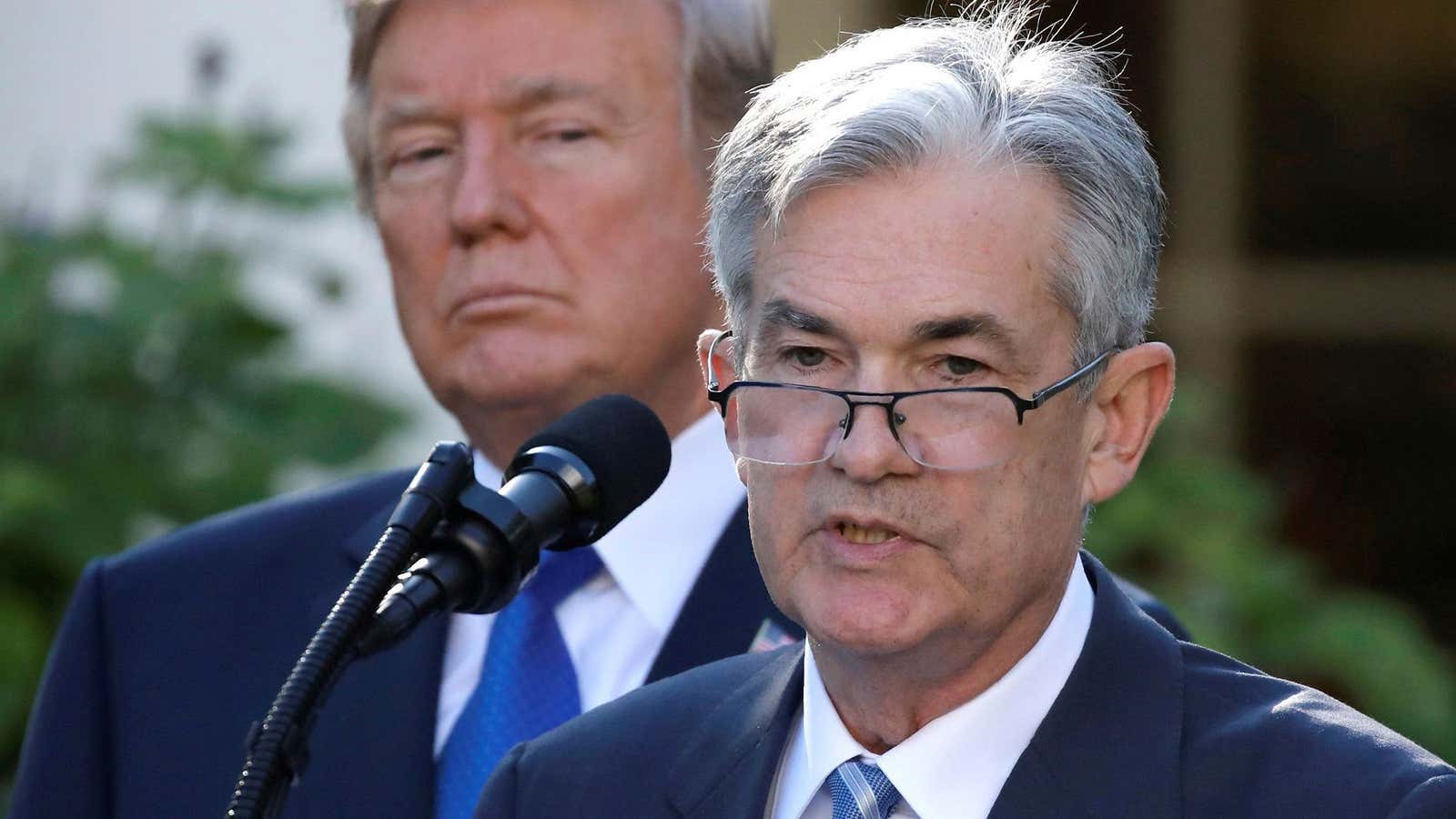Political meddling with monetary policy rarely ends well. Just ask Richard Nixon.
In 1972, rumors were rife that Nixon had pressured Federal Reserve chair Arthur Burns to goose the economy ahead of the president’s reelection campaign. What followed was a period of accelerating inflation combined with weak economic growth—known as stagflation. With the Fed succumbing to party politics, the central bank shirked its responsibility to keep the economy steady.
In the 1980s, similar experiences elsewhere saw most developed economies embrace the idea that central banks should be free from political interference—and plenty of research supports this logic. However, the 2008 global financial crisis and ascendent populism around the world have dented that long-established consensus.
Most notably, Donald Trump has been increasingly critical of the Fed’s ongoing round of interest-rate hikes. “I should be given some help by the Fed,” he told Reuters last week. Although the sentiments are similar, Nixon kept his criticism of Fed policy behind closed doors.
Fed chair Jay Powell, appointed by Trump earlier this year, should’ve been all smiles going into his high-profile speech today (Aug. 24) at Jackson Hole, Wyoming during the annual confab of the world’s central banking elite. US economic growth is tumescent, unemployment is at its lowest level since 2000, and inflation is relatively subdued. Slowly but surely, the Fed is reining in its post-crash stimulus measures with little controversy.
That is, aside from the angst within the White House. Though Trump may look longingly at the iron-fisted control other leaders exert over their central banks, the historical record of strong-arming them into serving political aims isn’t a happy one.
🇷🇺 Russia
When president Vladimir Putin brought the central bank under the thumb of his finance ministry in 2002, the institution lost control of monetary policy. The result? A central bank unusually, and unsuccessfully, focused on currency—rather than price—stability. Putin seems to have learned his lesson. While Elvira Nabiullina’s appointment as head of Russia’s central bank in 2013 was interpreted as a consolidation of Putin’s influence (paywall) on monetary policy and banking regulation, he has instead stepped well back. Nabiullina has shut hundreds of weak banks and brought inflation back under control. “Her position demands more independence…because the central bank is independent in accordance with our legislative system,” a spokesperson for Putin told the Wall Street Journal recently (paywall).
🇹🇷 Turkey
President Recep Tayyip Erdogan’s stymying of his central bank is infamous. He has described interest rates as “the mother and father of all evil” and blamed a shadowy “interest rate lobby” for inciting riots. After winning reelection in June with expanded powers, Erdogan appointed his son-in-law to lead the finance ministry and lifted limits on the central bank governor’s term, giving himself de facto control over all aspects of monetary and economic policy. High interest rates don’t fit with Erdogan’s growth strategy. That meant the bank felt unable to do the one thing that could stop the relentless decline of the Turkish lira.
🇻🇪 Venezuela
Chief among Venezuela’s hyperinflationary woes is president Nicolás Maduro’s desire to control all aspects of the economy—including the central bank—under the guise of promoting equality. Venezuela has had six central bank chiefs since Maduro took office in 2013. And since the president’s controversial 2017 constitutional reforms, central bank chiefs are appointed by the all-powerful constituent assembly, which is completely controlled by Maduro allies. At the president’s behest, the central bank has even stopped publishing key economic data about inflation and the money supply.
🇦🇷 Argentina
Thanks to Venezuela’s misfortune, not as much attention has focused on the other South American country with weak economic growth, double-digit inflation, and a big debt burden. Argentina’s central bank similarly suffers from a dysfunctional relationship with politics. Thanks to enormous political pressure and a plunging peso, central bank chief Federico Sturzenegger and a slew of high-ranking officials abruptly resigned in June. He was replaced by finance minister Luis Caputo. Just before president Mauricio Macri took office in 2015, his allies described the bank (paywall) as the “most urgent problem.” Though Macri’s government initially backed the bank’s fight (paywall) against inflation, is has also been keen to use it as a scapegoat for the country’s sputtering economy.
